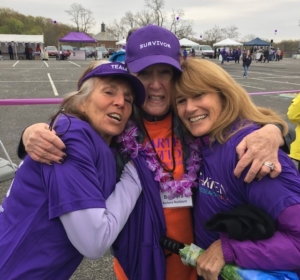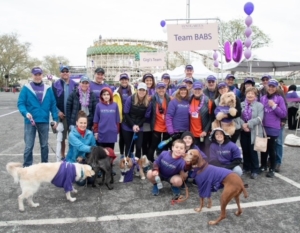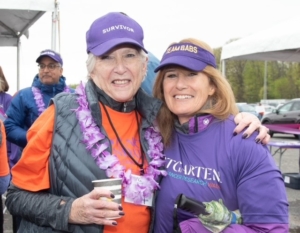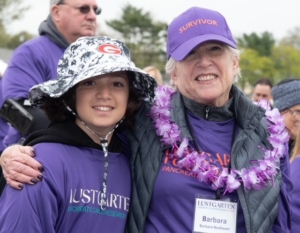“Doctors Tell Me I’m a Miracle”
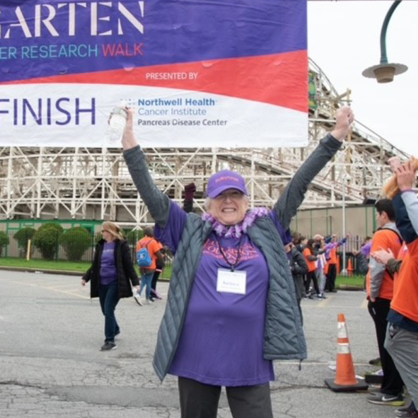
“Doctors Tell Me I’m a Miracle”
Barbara Nusbaum considers herself incredibly lucky.
In October 2007, when Barbara was just 58, she was unexpectedly diagnosed with Stage 3 pancreatic cancer. Leading up to this life-threatening diagnosis, she experienced intestinal issues, jaundice, and incessant itching all over her body. Her doctor immediately sent her for a CT scan and told her there was something unusual on the scan. Following several other tests, she was blindsided by a pancreatic cancer diagnosis; she was otherwise healthy and had no family history of the disease, so the news came as a complete shock. At first, she didn’t realize how poor the five-year survival rate for pancreatic cancer was in 2007—just 5% of patients survived for more than five years!
Barbara immediately underwent treatment with chemotherapy to shrink her tumor, with the goal of having surgery to remove the tumor once it was small enough to be excised. On January 2, 2008, Barbara underwent a grueling eight-hour Whipple procedure, intended to remove part of the stomach, the duodenum (the first part of the small intestine that connects to the stomach), the head of the pancreas, part of the bile duct, the gallbladder, and lymph nodes in the area of the pancreas. However, when she awoke from the complicated procedure, her anticipation that the cancer had been removed was quickly replaced with overwhelming disappointment; her surgeon discovered that her tumor had invaded a major blood vessel. He was unable to remove the tumor because taking it out would have risked her life.
After recuperating from the unsuccessful Whipple attempt, Barbara resumed treatment with chemotherapy and radiation to shrink the tumor. Her doctor hoped that with further treatment, the tumor would continue to shrink considerably. Finally, the tumor was small enough to be safely taken out. However, Barbara’s excitement about having the tumor removed was tempered by her doctor’s sobering news she’d now need a second Whipple procedure just six months after the first one had failed, dropping her five-year survival rate to an abysmal 2%. Gratefully, the second Whipple was a success, and the tumor was removed entirely. Following surgery, Barbara underwent radiation treatment—a precautionary step to ensure no cancer cells were left behind during surgery.
Throughout Barbara’s treatment, she was so grateful for the unwavering support of her family—including her devoted husband Marc, her daughter Staci, her son Perry, and her grandchildren—and friends, who were convinced that if anyone could beat this disease, it would be Barbara. She was committed to finding the best medical team, surrounding herself with love, and concentrating on everything she had to live for.
“I focused on the positive, made peace with my diagnosis, and fought my hardest to have more time with my family. Nothing was more important to me than being here to watch my grandchildren grow up,” Barbara commented. “I always believed I would survive, and I know my optimistic outlook helped me fight pancreatic cancer.”
Despite Barbara’s optimism, she understandably experienced moments where she cried, overwhelmed with grief and anxiety. She considered those moments of sadness “cleansing sessions” and she let her body do whatever it was feeling—crying when she was terrified, resting when her body told her she needed time to heal.
Now, 15 years after Barbara was declared cancer-free, she no longer needs scans. She has developed diabetes, which is under control with insulin, and minimal problems with her gastrointestinal system, but Barbara believes these conditions are manageable and are so minor compared to the benefits of having surgery. She advises other patients to stay strong, optimistic, and hopeful, and remember that more people are surviving this disease every year.
“Doctors tell me I’m a miracle,” said Barbara. “Everyone who gets pancreatic cancer should be able to say, ‘I’m a survivor.’ It breaks my heart that not everyone survives this devastating disease.”
Throughout her experience with pancreatic cancer, Barbara appreciated the tremendous support the Lustgarten Foundation provided. To show her gratitude and bring hope to other patients, Barbara’s daughter organizes Team BABS at the annual Westchester County Walk for Pancreatic Cancer Research. Barbara doesn’t just attend the walk every year; she helps Walk Leader Tara Shanes-Hernandez, who lost her mother to pancreatic cancer, to plan one of Lustgarten’s biggest fundraising events of the year.
“Tara considers me a hero,” Barbara said. “That makes me appreciate my life even more and motivates me to share my story with other patients and their families, let them know there is hope, and encourage them to maintain a positive outlook while confronting such a devastating disease.”
Surrounded by family and friends, Barbara looks forward to proudly wearing her SURVIVOR hat and cutting the ribbon every year to officially start the walk. The event is a celebratory, joyous occasion because everyone there is striving for the same goal: giving patients and their families the precious gifts of more hope and more time together.
“Thank you to everyone who donates to the Westchester Walk for Pancreatic Cancer Research and to the Lustgarten Foundation’s other events and walks. The more you give, the better you’ll feel because you’re helping to support life-saving research and making a difference for everyone impacted by this horrible disease.”
This year, Barbara and her husband feel blessed and thankful to be celebrating their 54th wedding anniversary. “I’m extremely grateful there was a blockage in my pancreas that created itching, jaundice, and intestinal issues,” Barbara remarked. “Otherwise, my disease would likely have been found too late for effective treatment, and my story could have had a very different outcome.”

